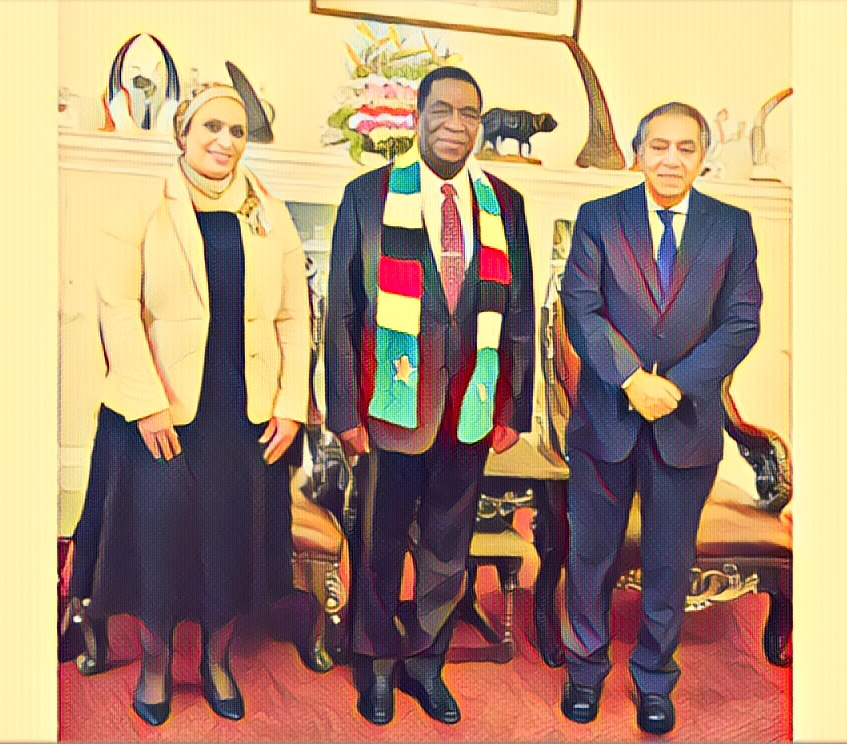Zimbabwe’s agricultural sector is set to receive a major boost from a group of Egyptian investors who have expressed interest in opening a fertilizer plant in the country. The investors, from Polyserve Fertiliser and Chemical Group, met with President Emmerson Mnangagwa and Vice President Constantino Chiwenga in Harare last week and discussed their plans to develop the phosphate fertilizer industry in Zimbabwe.
Zimbabwe has great potential for phosphate fertilizer production, as it has abundant phosphate rock deposits, mainly from the Dorowa mine in the eastern part of the country. However, the country has been facing challenges in meeting its domestic demand for fertilizer due to inadequate infrastructure, foreign currency shortages, and low investment. As a result, Zimbabwe has been importing fertilizer from neighboring countries, such as South Africa and Zambia, at a high cost.
The Egyptian investors said they have the experience and knowledge to help Zimbabwe improve its fertilizer industry and make it a regional hub for phosphate fertilizers. They said they intend to manufacture fertilizer in Zimbabwe in cooperation with the Zimbabwean government and local partners. They also said they would conduct a feasibility study on the project, which would be implemented in different phases.
President Mnangagwa welcomed the investors and encouraged them to expedite the project, which he said would save the country over US$250 million per annum on the fertilizer import bill. He also said the project will create employment opportunities and enhance food security in the country. He assured the investors of the government’s full support and commitment to ensuring a conducive environment for investment.
Vice President Chiwenga also expressed his appreciation to the investors and said the project will contribute to the government’s vision of transforming Zimbabwe into an upper-middle-income economy by 2030. He said the government is committed to achieving local beneficiation and value addition at source and enhancing the value chain for local, regional, and international markets.
The Egyptian delegation was led by Dr Sherif El Gabaly, the chairman of Polyserve Group and the chairperson of the African Affairs Committee in the Egyptian Parliament. He said the project will strengthen the historic relations between Egypt and Zimbabwe, which date back to Zimbabwe’s liberation struggle. He also said the project will promote intra-African trade and integration, in line with the African Continental Free Trade Area (AfCFTA) agreement.
The visit by the Egyptian investors follows a meeting between President Mnangagwa and his Egyptian counterpart, President Abdel Fattah Al-Sisi, on the sidelines of the African Development Bank meetings in May. The two leaders agreed to enhance bilateral cooperation in various sectors, including agriculture, energy, mining, tourism, and trade.
The fertilizer project is expected to positively impact Zimbabwe’s agricultural sector, which is one of the key pillars of the country’s economy. Agriculture provides employment and income for 60-70 percent of the population, supplies 60 percent of the raw materials required by the industrial sector, and contributes 40 percent of total export earnings. Agriculture also contributes approximately 17 percent to Zimbabwe’s GDP.
Zimbabwe has been experiencing recurrent droughts and climate shocks that have affected its agricultural production and food security. The country has also been grappling with economic challenges such as inflation, currency instability, and debt. The fertilizer project is expected to improve agricultural productivity and resilience and reduce dependency on imports.
The project is also expected to benefit smallholder farmers, who produce 70 percent of staple foods such as maize, millet, and groundnuts. These farmers have limited access to irrigation facilities and rely on rain-fed agriculture. The project will provide them affordable, quality fertilizer to enhance their crop yields and incomes.
The fertilizer project is one of the many investment opportunities Zimbabwe offers foreign investors interested in tapping into its vast natural resources and human capital. The government has been implementing various reforms to improve its ease of doing business ranking and attract more foreign direct investment. The government has also engaged with international partners and creditors to restore its relations and clear its arrears.
Zimbabwe is optimistic that with more investment projects like the fertilizer plant, it will be able to overcome its challenges and achieve its development goals. The country is determined to harness its potential and realize its vision of becoming a prosperous nation.
Source: The Herald


